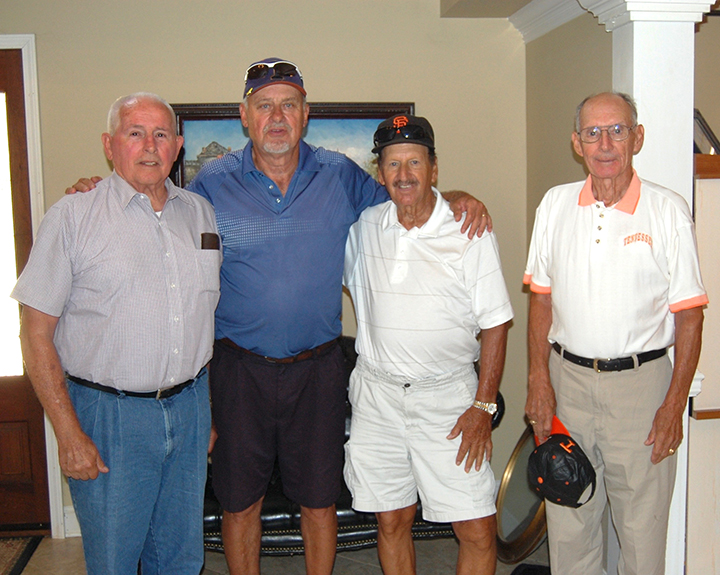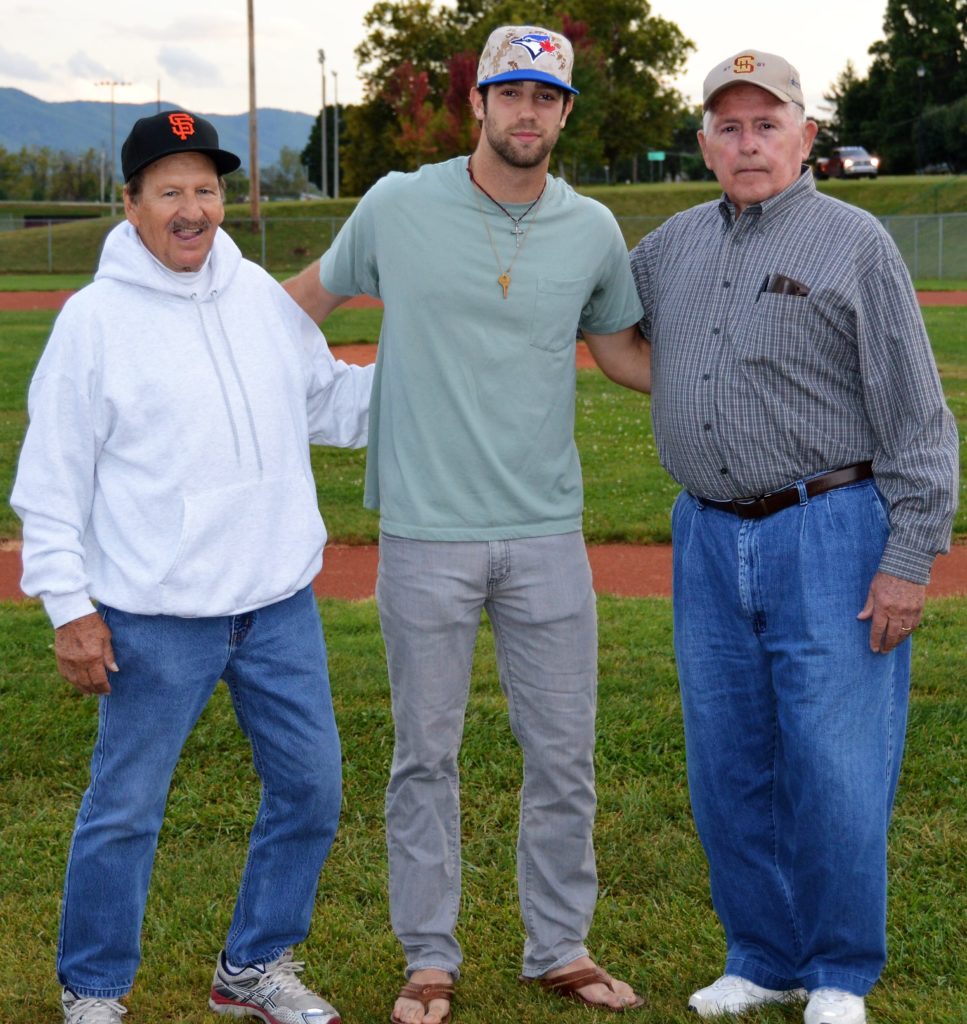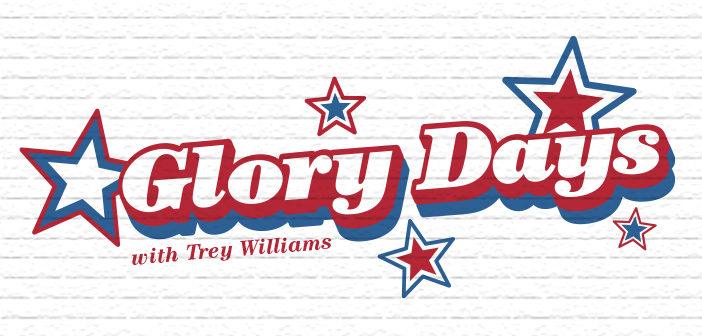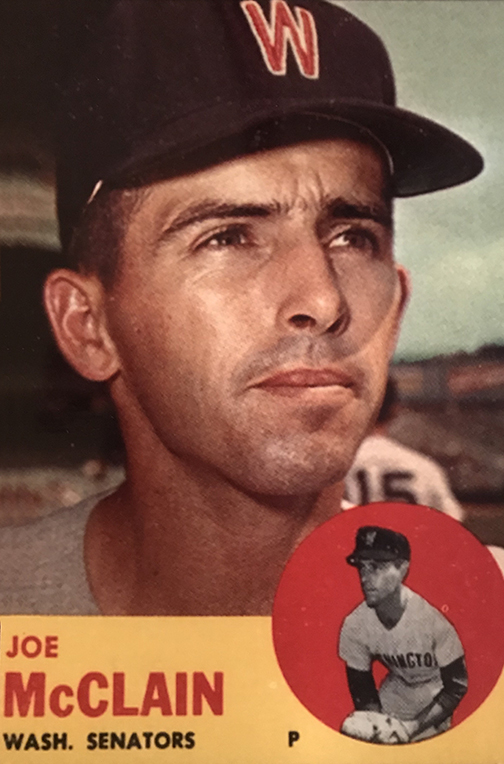By Trey Williams
It’s been 60 years since Science Hill graduate Joe McClain pitched for Major League Baseball’s expansion Washington Senators, but he recalls striking out Mickey Mantle twice in a game like it was yesterday.
Of course, the two times he didn’t strike out Mantle in that game remain fresh in his mind as well.
McClain was a sore-armed, 28-year-old rookie “junker-baller” pitching for the expansion Washington Senators when they hosted the New Yorks Yankees on July 18, 1961. Mantle struck out twice and homered twice against McClain in the Yanks’ 5-3 victory.
One home run was wind-aided; the other might’ve aided the wind.
Mantle’s “bomb” came when McClain shook off a fastball after throwing 7-8 straight fastballs while Mantle worked the count full.
“They told me not to throw Mantle any offspeed stuff,” the 88-year-old McClain said Monday evening while sitting on his porch eyeing some tomatoes he thankfully managed to pick before the deer got ‘em. “And the catcher signaled for a fastball and I shook him off. And he let me get my dose of medicine. I threw a little ole changeup or scroogie ball … and I’m telling you what, you’d had to pay cab fare to go how far he hit that ball.”
Mantle hit 54 home runs that season for 109-win New York, which also got a record-breaking 61 home runs from Roger Maris. But Maris was 1-for-11 with a single against McClain, whose best outing against New York came on July 1 at Yankee Stadium. McClain, normally a starter, pitched 5 1/3 innings of relief against the Yankees, allowing one run on five hits and a walk.
“Maris didn’t put me in his record book, I’ll tell you that,” McClain said. “Maybe the first time, he got a hit to center field. And other than that, I can’t ever recall him getting a hit off me. …
“My goodness, the Yankees were something. Mantle, Maris, (Yogi) Berra, Elston Howard.”
McClain, who played on Science Hill’s Southeast Regional champion in 1949 and state runner-up as a senior in ’51, went 8-18 with a 3.86 ERA for the Senators (Texas Rangers) in 1961.
It was especially important for pitchers to help their own cause for Washington, which finished last in the American League in runs. And McClain did just that while recording the first victory in franchise history.
On April 14, 1961, he pitched a complete game in Griffith Stadium while defeating the Cleveland Indians, 3-2. Cleveland had Tito Francona, Jimmy Piersall and Gary Bell, who McClain outdueled for the victory by allowing seven hits and no walks. McClain also had an RBI double off Bell and scored a run.
Senators manager Mickey Vernon gave McClain a pitch to work with before he would have him try to sacrifice Pete Daley to second base.
“Mickey Vernon said, ‘Can you hit?’ I said, ‘You’re dang right I can hit,’” McClain said. “He said, ‘Okay, if he gets on first base, take you a swing at the first pitch … and if nothing happens get him over with the second pitch.’ Boy, I tell you what, the first pitch Gary threw in there, I hit a screamer into right-center field for a double and it scored a run. I said, ‘Yeah, a man hitting a thousand and got an RBI.’ ”

McClain was a threat with a bat in his hand. He tied for first in a Home Run Derby with Luke Easter one year in Rochester. He had the lone RBI in Science Hill’s 4-1 state championship loss to Memphis South Side as a senior in ’51 after shutting out Whitehaven in a 3-0 semifinal victory win.
McClain reunited with former Science Hill teammate Billy Joe Bowman as a freshman with the Tennessee Volunteers in 1952, and McClain led the Vols in hits and RBIs and tied for the team lead in runs.
Bowman, whose younger brother Ferrell played shortstop for the San Francisco Giants in the 1962 World Series, had homered and recorded two victories while helping Tennessee finish runner-up in the 1951 College World Series.
McClain chuckled when it was mentioned that he’d homered off Billy Joe when he faced him in a Spring Training game a few years later.
Ferrell was a dazzling utility infielder for San Francisco, albeit a light-hitting one. He often said his low batting averages were partially caused by not stringing many at-bats together, not to mention the fact that no Giants infielder ever seemed to need a day off unless someone like Gibson, Koufax or Drysdale was pitching.
But Ferrell would excitedly tell you about McClain’s ability at the plate.
“I’m telling you, Joe could hit,” Ferrell said. “And as we’d go around the circuit and he was playing and I’s playing, they’d say, ‘Is he from Johnson City?’ I said, ‘Yeah.’ And they said, ‘Well, damn, let him give you some hitting lessons. He’s the best hitter I’ve ever seen for a pitcher.’ Really, I would hear that all the time.”
McClain only made it a month with Washington in ’62 and pitched 10 innings in Triple-A Richmond in ’63 before calling it quits. His right elbow, which he’d injured as rookie with the Johnson City Cardinals in 1953, required a cortisone shot every outing.
But he loved every minute of the painful process. He’ll laugh talking about pitching Minnie Minoso tight for crowding the plate, and laugh harder talking about Jimmy Piersall and Yankees pitcher Jim Coates cussing one another after Coates’ brush-back pitch was followed by a Piersall double.
“Piersall was probably at least a brick shy of a load,” McClain said. “Boy, were they cussing each other out.”
McClain wanted to cuss when his dad wouldn’t let him sign to play professional ball right out of Science Hill.
“You had to have your parents’ permission if you weren’t 21,” McClain said. “My dad wanted me to go to college. But you know what they say about how you can lead a horse to water?”
Tennessee football coach Robert Neyland wanted McClain to punt after hearing about his 65-yard, left-footed spirals and coming out to see for himself the following day.
“Neyland was a big man,” McClain said, “and he looked at me and said, ‘Where you from?’ I said, ‘Johnson City.’ He said, ‘You played football somewhere didn’t you?’ I said, ‘I played at Science Hill.’ He said, ‘Who for?’ I said, ‘Mule Brown.’ ‘Ah, I know him.’
“He didn’t like Mule, and Mule didn’t like him either. They both run the single-wing and I guess they both thought they knew everything. …
“But anyway, he says, ‘I want you out for football Monday.’ I said, ‘No sir, I’m down here on a baseball scholarship.’ He said, ‘I want you out for football. I give out the damn scholarships down here.’ I said, ‘Yes sir.’”
Shortly thereafter, McClain heard from baseball coach Cy Anderson.
“Ole Anderson said, ‘I’ll take care of the bull,’ ” McClain said. “And I never heard another word about it.”
Of course, McClain left UT after one year.
“They were great to me down there and all like that, but I just hated going to school,” McClain said. “The fact that I didn’t want to go to school was the biggest thing that was wrong with me. I didn’t want to study, to put it mildly. … I wanted to play pro ball and that’s all there was to it.”
McClain had dreamed of that day since growing up at 317 Highland Avenue, where he’d throw a tennis ball against the side of the house to work on accuracy, diving catches and fielding ground balls.
“We lived with my grandparents,” McClain said. “We lived in the upstairs and they lived in the downstairs.”
McClain was reminded of Highland Avenue decades later when Johnson City Cardinals general manager Lonnie Lowe brought Lou Brock in to introduce McClain into the East Tennessee Professional Baseball Hall of Fame.
“Lou Brock said, ‘Joe grew up the way I did. He messed around and threw rocks and threw balls against the wall and all that stuff,’” McClain said. “And I swear to you I sat there and laughed and he’d look at me. He said, ‘I know he understands what I’m saying, because he done it too.’ … Kids back then knew how to play by themselves.”
McClain said he spent a lot of his childhood at the Mountain Home ballpark at the V.A.
“I loved that ballpark, loved the stands,” McClain said. “Pappy Crowe and his father were always over there. I got a hit off Hardrock Shoun playing there.”

Mountain City native Clyde “Hardrock” Shoun pitched in the majors from 1935-49.
McClain and Ferrell Bowman were born within a two-year span (1933-35). Another Washington County native who made the major leagues, Jonesborough’s Jim Constable, was also born in ’33.
The next Washington County product to make the majors was Daniel Norris in 2014.
“Jim Constable was a fastball-slider pitcher,” McClain said. “He threw pretty hard. … We had some good ballplayers come along back then.”
McClain said two of his Science Hill teammates on the ’49 team, center fielder Willis Sexton and catcher John Mackley, were outstanding pro prospects, too.
Baseball in Johnson City ended on a sour note for McClain in ‘53. He went 10-2 for Johnson City and led the way with a .344 average for the Cardinals, who finished first in the Appalachian League with an 84-43 record.
But he hurt an elbow while trying to throw a runner out at home plate from center field after having pitched in the earlier game of a day-night doubleheader.
“The coach told me not try to throw anybody out after pitching,” McClain said slowly through a bemused smile. “But I did anyway.”
His velocity was never the same afterward. Still, McClain went 71-63 during the ensuing seven seasons in the minors, including Triple-A seasons in Denver, Rochester, Richmond, Syracuse, Charleston and Omaha.
“It’s tough to pitch when you’re getting a shot every time you pitch a ballgame – a big cortisone shot in the shoulder to keep you going,” he said. “That’s the way it ended up with me. I couldn’t throw the ball when I come home (after the ’61 season). … I got to play another couple of months up there, maybe (the following season), and then they sent me back to the minor leagues again and that was it, really.”
A versatile athlete, McClain finished first in the state in the javelin at Science Hill shortly after learning what a javelin was.
“I still have the record,” he said with a smile. “They no longer have the javelin.”
McClain also played football. The late Sidney Smallwood, a longtime Hilltoppers coach and athletic director, more than once mentioned McClain in the same breath as fellow fullback Bo Austin, who went on to become the Sun Bowl MVP while playing for George Washington in 1957.
“I’m gonna tell you what, Bo Austin was a dang good football player,” McClain said. “Don’t let anybody ever tell you different. He was tough, brother.”
Austin also lived near Mountain Home on Hamilton Street. McClain’s childhood memories include riding his bicycle to the Watauga River for swims, jumping a train to ride across Johnson City after getting two big donuts for a nickel downtown and swimming in a water tank that was used to cool coal engines near ETSU’s current baseball stadium.
“The good Lord has to look after kids … and they get to be teenagers and they think they’re invincible,” McClain said. “I had a wonderful upbringing, you know. It wasn’t all perfect – I don’t mean that – for me or them either. I guess I gave them a lot of trouble and certainly I thought they did me at times. But nevertheless, they were right and I was wrong, and that’s the biggest thing about it.
“We didn’t have a whole lot. I heard an ole guy say one time, ‘I was born with nothing and I got most of it left.’ (laughter) So that’s just about the way I feel about things now. … “I’ve had a wonderful life. Wouldn’t trade none of it. … I saw a lot of good ballplayers, and a lot of them ended up being Hall of Famers. What more could you ask for? I got to play against ‘em and I got them out every once in a while.”





